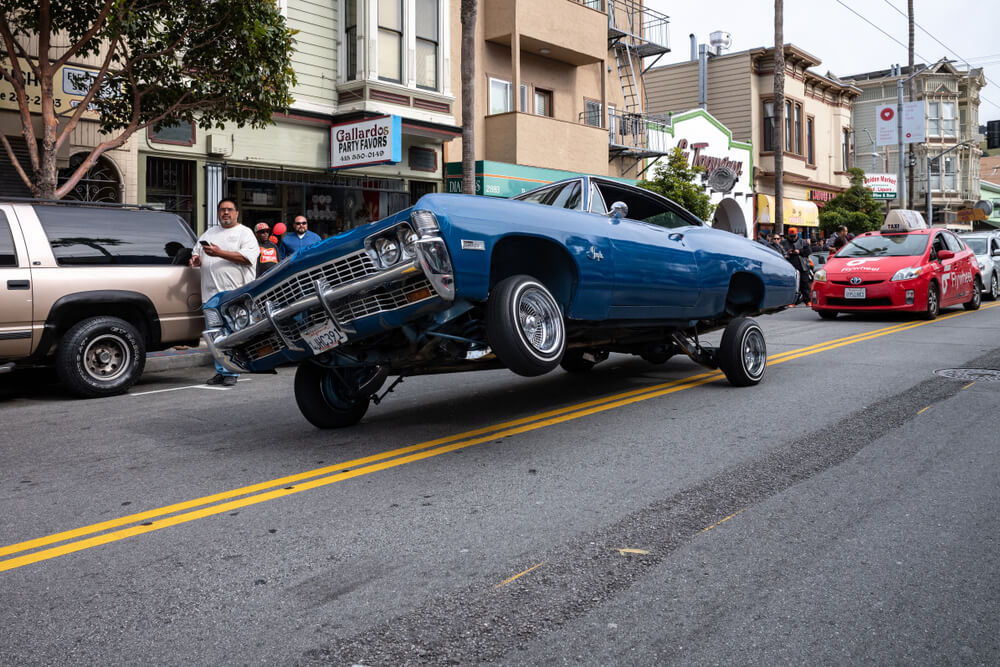If you’re really into cars, you probably want to buy a really cool ride or even modify the one you have to make it just a little extra. Just make sure you know your state’s rules about owning or driving a modified vehicle. For instance, squatted trucks, also known as ‘Carolina Squats,’ are now illegal in some states. Here’s what you need to know about the squatted truck ban.
Where are squatted trucks illegal?
Quite ironically, both Carolinas have banned the ‘Carolina Squat!’. This means that squatted trucks are now illegal in Arkansas, North Carolina, South Carolina, Tennessee, Louisiana, and Virginia.
In May 2021, North Carolina lawmakers approved legislation making squatted trucks illegal in the state. The legislation went into effect on December 1, 2021.
The North Carolina General Assembly law states that a private passenger automobile must not be modified by elevating it to more than 3 inches above the manufacturer’s specified height in the front or lowering it by more than 2 inches below the manufacturer’s specified height in the rear.
The legislation further states that ‘a private passenger car changed or altered in contravention of this paragraph must not be used on any highway or public vehicular area.’
If you break this law, your license could be suspended for a year.
In March 2022, Virginia followed suit. Virginia’s governor signed a ban on squat trucks into law some weeks after an incident that killed a 27-year-old man. The bill, signed by Gov. Glenn Youngkin, restricts modifications that raise a vehicle’s front bumper 4 inches or more above the back bumper.
In certain other states, like Florida, they’re legal as long as they meet certain conditions.
Summary of state regulations against squatted trucks:
| State | Status | What’s Illegal |
| North Carolina | Illegal | Ban on raising the front more than 3″ above stock or lowering the rear more than 2″; escalating fines, license suspension on repeat offenses |
| South Carolina | Illegal | Bans trucks with 4″+ difference in front-to-rear height; escalating fines and possible license suspension |
| Virginia | Illegal | Similar restrictions, excessive front lift is banned |
| Tennessee | Illegal | Prohibits fender height disparity ≥4″ front over rear; misdemeanor penalties and higher fines for repeat offenses |
| Louisiana | Illegal | Targets trucks with 6″+ front-to-rear height difference; penalties vary by area |
| Arkansas | Illegal | Prohibits front bumper 4″+ above rear; fines and license suspension apply |
| Florida | Legal | Must not exceed a height of 13 feet 6 inches, including any modifications to the suspension or body. |
While all this is happening, another petition on Change.org also wants to keep Carolina Squat truck modifications legal!
With all this brouhaha happening over squatted trucks, let’s look at what a squatted truck is and why some folks want it banned while others swear by it.
What is a squatted truck?
A squatted truck is essentially a pickup truck with a lift kit fitted on the front end, while the rear end stays at stock–or even lowered–ride height. Since the back end is near the ground, the truck appears to be squatting, thus the name.
Where did squatted trucks originate?
Contrary to what its name, ‘Carolina Squat,’ indicates, the squatted truck trend did not start in Carolina. It, in fact, arose from Baja racing in California and gained popularity as hundreds of drivers shared images of their squatting automobiles on Instagram.
And that’s not the only name that it has. Others call it a truck or SUV with a ‘California Lean’ or a ‘Cali Lean.’ Some people also refer to a squat as a ‘Tennessee Tilt.’
Why squat a truck?
Baja racers squatted trucks because when they fly over a jump and crash onto the earth, the rear hits first. The reason behind this was that it would help avoid major accidents. Racers can then do daring leaps without the danger of collapsing.
Since desert racing is no longer a thing, there is no genuine functional need for folks to squat their trucks. Instead, drivers mostly do it for ‘aesthetic’ reasons these days, probably helped by its social media popularity.
The Carolina Squat is kind of popular on social media. This sort of customized car has its own Facebook groups and Instagram profiles. In addition, due to market demand, several manufacturers have created their own squat kits that are available for purchase by anybody.
Are squatted trucks dangerous?
The upward tilt of the front of the truck or car makes this modification dangerous. Drivers may not be able to see well ahead of them when driving, which might result in traffic accidents. In addition, the higher the truck’s front, the more difficult it is for the driver to see ahead, consequently increasing the odds of a crash.
The truck’s tilt makes it hard for the headlight to light up the road properly, as the car maker intended. As a result, it may blind other incoming cars, perhaps leading to an accident.
The truck’s suspension wears out more quickly because the front is tilted up and the rear is lowered. The unstable suspension and poor weight distribution mess up the brakes and steering. Not just that, when a vehicle’s weight is mostly on the rear tires, it can affect how well the front tires can brake and steer. This can make it harder to control the vehicle.
Another downside to squatting your truck is that it loses its ability to tow or haul.
The science behind why squatting is bad for your truck
When your truck squats, more of the underbody is exposed. This increases frontal area and, as a result, aerodynamic drag. According to the EPA, aerodynamic drag is the most significant factor affecting engine efficiency while driving at high speeds. In addition, when towing, squats may cause the front of your trailer to dip, damaging the aerodynamic design that the trailer manufacturer may have designed.
When weight distribution is uneven, rolling resistance (also known as rolling friction) increases. This, in turn, reduces engine performance. Add to that the excessive and unequal tire and brake pad wear caused by improper weight distribution, and your squatted truck might really start to hurt your wallet.
It’s for these reasons that there’s a growing call to ban squatted trucks.
Renée Martin is a travel and car expert who focuses on road and air travel in the U.S. For the past 6 years, she’s been helping make driving and trip planning easier and budget-friendly for everyday travelers.



















